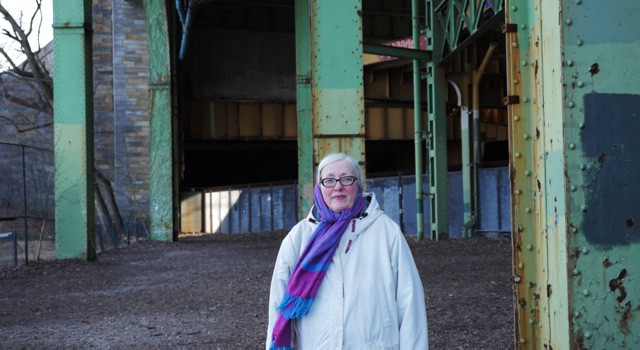Markie Hancock is a documentary filmmaker working in New York City. Her works include “Born Again” and “Queers in the Kingdom.” Both docs explore evangelical Christianity and the formation of LGBT identities. She has also directed docs that examine the intersection of race and education, including “Off Track: Classroom Privilege for All” and “Echoes of Brown v. Board of Ed.”
“Feral Love” will premiere at the 2016 DOC NYC film festival on November 11.
W&H: Describe the film for us in your own words.
MH: “Feral Love” follows Dorian Rence in the railroad tunnels of New York City caring for her feral cat colony, and it follows her through the halls of the New York Philharmonic as she pursues her 40-year career as a violist.
The film explores the life of the cats and the life-story of an elite musician who has played with all of the greats, including Leonard Bernstein, Pierre Boulez, Zubin Mehta, Luciano Pavarotti, Isaac Stern, and Yo Yo Ma. So, is she a “crazy cat lady” or world-class musician?
W&H: What drew you to this story?
MH: I take our two pitbulls to a secluded dog run by the railroad tunnels and I would see this woman feeding the feral cats religiously every morning. I observed her for a few years before I finally approached her and began a conversation. Once I found that she played in the Philharmonic I became really intrigued. I was drawn to her commitment to the cats and to her commitment to her career as a gifted musician.
What’s most interesting to me is that she doesn’t make a distinction between performing on all the world’s great stages and feeding the cats in the bowels of New York City. They both have meaning and beauty. I found that powerful.
W&H: What do you want people to think about when they are leaving the theater?
MH: I hope viewers feel encouraged to embrace their inner “crazy cat lady,” and I mean this as a metaphor for all genders and all pursuits. I’d like viewers to reconsider preconceived notions of what matters and who counts, and feel emboldened to consider their own life desires and commitments with a fresh energy and compassion.
W&H: What was the biggest challenge in making the film?
MH: At the very beginning, I wasn’t sure if there was a story there. I found the urban setting gorgeous and I was very curious about Dorian — but that doesn’t make a film. Then I realized there was probably at least a short film that made sense.
The story emerged as a feature length film slowly over time, as Dorian and I got to know each other and I realized the depth and extent of her story. It was a challenge grappling with “what content constitutes a full-length film,” and deciding whether your subject or issue is a short film. Both are equally worthy, of course.
W&H: How did you get your film funded? Share some insights into how you got the film made.
MH: The film was self-funded. I shot most of it myself and would pay my cinematographer what I could and he was very generous with me. All the people who worked on this film were generous, including my spouse.
I think this is often the model for how independent films get made: passion and commitment to a story you are interested in telling and the generosity of others to bring it all together.
W&H: What does it mean for you to have your film play at DOC NYC?
MH: It means a lot, especially since “Feral Love” is such a New York story. It’s wonderful to have our New York City premiere with the festival. Secondly, DOC NYC is a really good festival. They are unbelievably organized and create an event where filmmakers have all these different opportunities for connecting with each other and with industry folks. And they curate a terrific lineup of docs!
W&H: What’s the best and worst advice you’ve received?
MH: Best advice: Follow your own interests and desires.
Worst advice: Follow what you think someone else wants.
W&H: What advice do you have for other female directors?
MH: Sometimes it’s best not to listen to too many voices. The most important voice to hear is your own, and oftentimes the best people to get advice from are the ones who really know you, not necessarily another filmmaker.
W&H: Name your favorite woman-directed film and why.
MH: “The Gleaners and I” by Agnes Varda. I will watch anything she makes, but this documentary in particular follows such a lyrically meandering self-conscious stream. It feels effortless and seamless even though you know there was so much intention and deliberation put into it, [including] weeks and weeks in the edit room.
W&H: Have you seen opportunities for women filmmakers increase over the last year due to the increased attention paid to the issue? If someone asked you what you thought needed to be done to get women more opportunities to direct, what would be your answer?
MH: Yes, I think opportunities are increasing, but certainly not enough and not fast enough, especially for women who want to direct Hollywood non-fiction features.
How to get more women opportunities to direct? Just like the drug laws, we need to change viewer’s appetites. If there is no end user/consumer the product doesn’t get made. I often will go to a movie solely because I see it’s directed by a woman and I want to buy that ticket, see her film, and encourage others. This is just one line of attack and there are many others. I do think change is happening.







